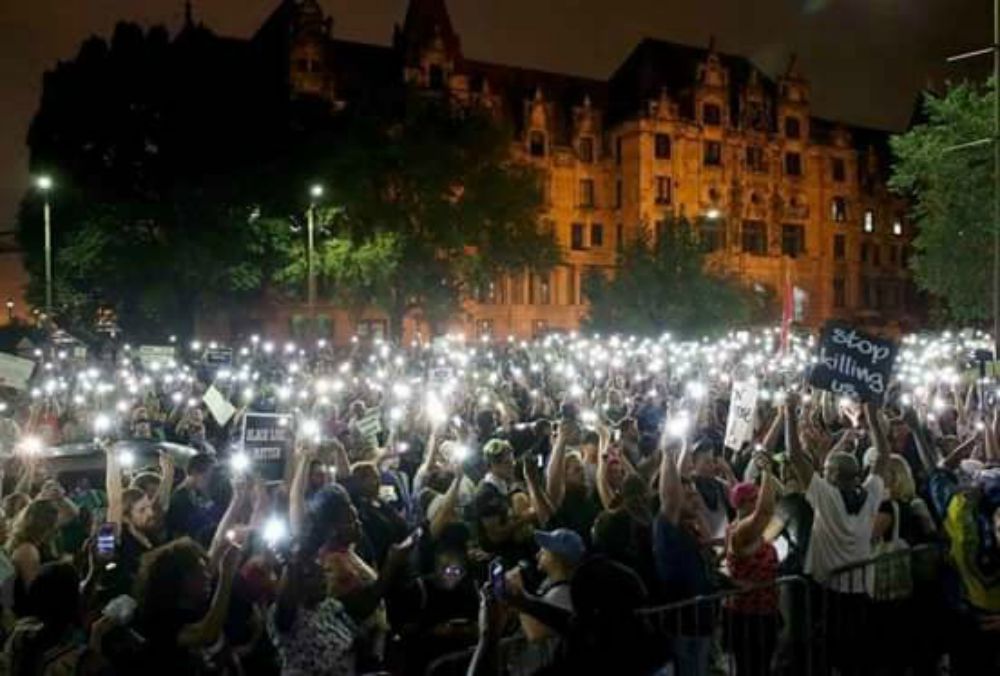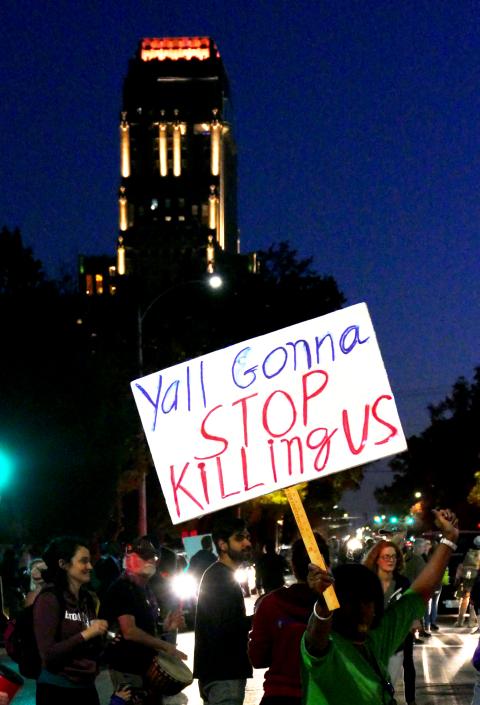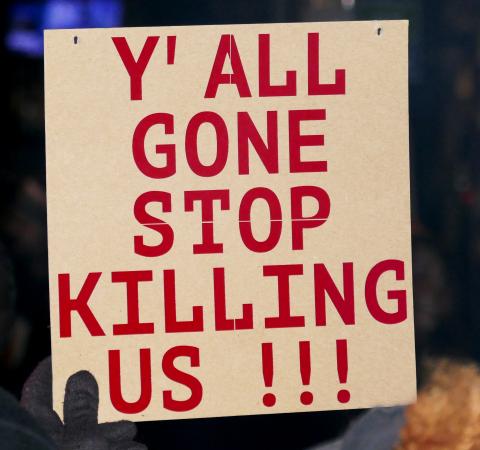
Demonstrators outside of St. Louis City Hall in downtown St. Louis, Missouri, Oct. 21 (Sharon Morrow)
A young mother with two children (I've known her since she was an infant herself) posted this question on Facebook: "Why are today's demonstrations so angry? The protests I went to as a kid weren't angry."
No, we worked to make those protests graceful, especially risking arrest. For several years, for example, we prayed in front of the General Dynamics headquarters once a week. (The company is global aerospace and military company that still has a small presence in St. Louis.) Before Thanksgiving, we held a 72-hour vigil. At Christmas, we had a big party with balloons and treats. And in between, we regularly trespassed and were arrested. It was all cheerfully choreographed.
We opposed nuclear weapons, and GD makes nuclear delivery systems like cruise missiles and the Trident submarine. One of our signs read: "It's a sin to possess a nuclear weapon." And we knew the risks of making a mistake and nuking a flock of geese. It was a serious business.
Advertisement
Yes, we were afraid of being killed, but we didn't chant: "You goin' stop killin' us." We didn't know anybody who'd been killed by nukes. Our fear wasn't visceral. Some weeks a car would drive by, somebody on his lunch hour, and he'd shout, "Nuke the whales." I even wrote a play, "Pity the Poor Whales" about our protests at General Dynamics. In the end, General Dynamics moved their HQ to the Washington, D.C., area, to be "nearer to their customer" and we hung up our placards or traveled to Oak Ridge and Los Alamos to protest.
These protests today are different. The planning meetings are different. The passion is different. Black protesters are angry. Friends and family are dead or wounded. Black lives are on the line always.

Demonstrators in the Central West End neighborhood of St. Louis, Missouri, Oct. 29 (Richard Reilly)
I'm an old lady, white, middle-class, almost 76. I can work up a hot anger at the experiences of my friends. A black man who does yard work for us got robbed at gunpoint this summer. They took the $200 in his shoe, but left him his flip phone, so he called the police. The white cop searched him right out there on the street, found a little pipe at the bottom of his backpack, and told him if he insisted on filing a complaint, the cop would take him in and hold him for drug possession. Evidence was sure to turn up drug traces in his pack. So he said he would drop the complaint. Anger still rises up in me on behalf of my friend. But then the anger drifts away.
My young black friends stay angry. It takes my breath away how angry they are. They don't suffer from anger drift like I do.
They march. They hold town hall meetings. They run voter registration drives. Right now they are leading the campaign against a sales tax to hire more police in St. Louis City. We already spend 42 percent of our budget on public safety. Their anger does not cloud their analysis: We have to do something different.

A sign held by a demonstrator in the Central West End neighborhood of St. Louis, Missouri, Oct. 28 (Richard Reilly)
I was at a meeting with our mayor with some of them. It was a frustrating meeting, like a fencing match with lots of verbal parrying. My comrades held their anger but that made the conversation even more complicated. At a couple of points I wanted to say to the mayor, a white lady about 10 years younger than me, "You have to come to the town halls and witness their anger. I know you can't really share it any more that I can, but you have to try. You have to try harder. You have to be there. Be a witness. Then be an actor. Be a mover. Be a shaker."
Angry or not, I still work to end nuclear weapons. I still work to end racism. I hope you do, too.





